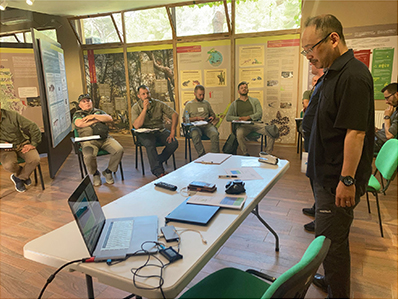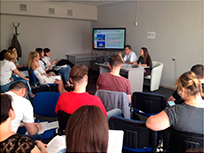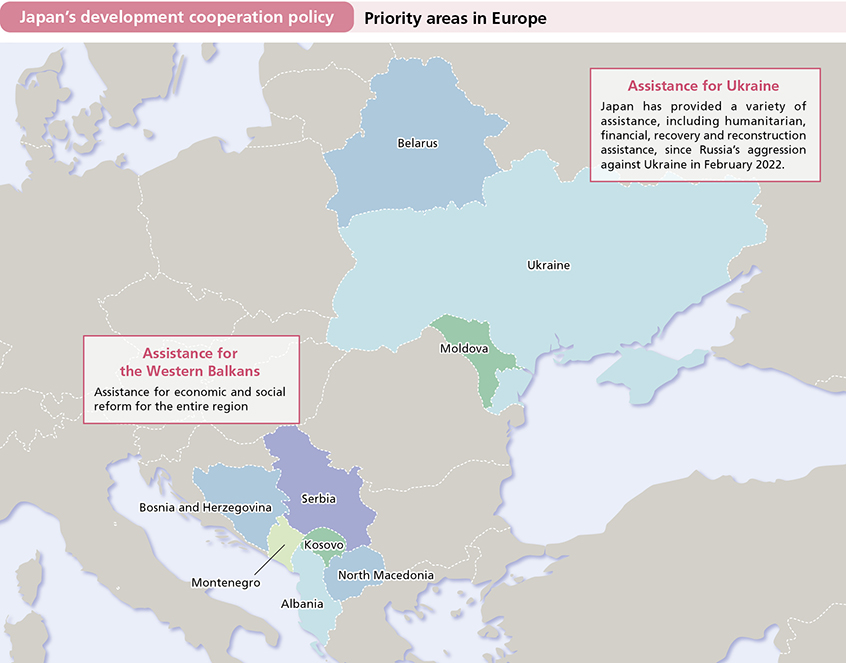5 Europe
Many countries in Central and Eastern Europe and of the former Soviet Union that were once under communist regimes currently pursue economic development based on market economies. Japan regards European countries as important partners that share fundamental values such as human rights, democracy, market economies, and the rule of law. With the aim of contributing to the further stability and development of Europe as a whole, Japan supports their efforts such as the reconstruction of economic infrastructure and addressing environmental issues. In addition, Japan works to strengthen comprehensive relations with the European Union (EU) and other regional international organizations based in Europe, by continuing and promoting dialogues and collaborations, and by building human networks.
Russia’s aggression against Ukraine since February 2022 has caused serious humanitarian crises in Ukraine and its neighboring countries. As of December 2022, there is still no prospect of the situation improving. People’s lives are seriously affected across the world, such as by supply chain cutoffs and soaring energy and food prices. Japan provides support to respond to these humanitarian crises, as well as medium- to long-term assistance toward the recovery and reconstruction of Ukraine (see Part I, 1, “Japan’s Efforts in Response to the Situation in Ukraine” for Japan’s Ukraine-related assistance).
● Japan’s Efforts

A Japanese expert teaching how to develop a model for ecosystem-based park management at Divjake-Karavasta National Park in Albania (Photo: JICA)
Japan provides assistance for their efforts such as the reconstruction of economic infrastructure and addressing environmental issues, with the aim of further strengthening relations with these countries that share fundamental values such as human rights, democracy, market economies, and the rule of law, as well as contributing to the further stability and development of Europe as a whole.
The reform of the Western Balkan countries Note 19 once slowed due to the conflicts in the 1990s. However, as a result of reconstruction assistance from various donor countries and international organizations, as well as reform efforts by the countries themselves, they graduated from the reconstruction assistance phase and are currently in need of assistance for sustainable economic development. Japan, in support of a unified Europe, provides development cooperation in collaboration with EU and others. Under the “Western Balkans Cooperation Initiative” Note 20 (2018), Japan supports necessary socio-economic reforms of the Western Balkan countries toward EU accession.
In Serbia, Japan provides support to promote the country’s high-quality economic growth by focusing on the development of the private sector, environmental conservation, and the improvement of economic and social services. The “Project for Modernization of Public Urban Transport in the City of Belgrade,” implemented since November 2020, aims to improve the ability of the Secretariat for Public Transport (SfPT) of Belgrade through efforts to improve the efficiency of public transport services (buses, trams, and trolleybuses), which are the major mode of transport for citizens, and improve their fair collection abilities. Through these efforts, the project aims to create an eco-friendly public transport system that the city hopes for. Furthermore, in Sid Municipality in the western part of the country, Japan supports the “Project for Capacity Development of Solid Waste Management,” which aims to establish efficient and sustainable general waste management models in small and medium local governments, and to promote area-wide waste management systems by encouraging garbage separation at the source and the “3Rs” (Reduce waste, Reuse, and Recycle resources), including the reduction of generated waste.
For Kosovo and Montenegro, Japan supports the “Project on Capacity Building for Disaster Risk Reduction through National Forest Fire Information System (NFFIS) and Ecosystem-based Disaster and Risk Reduction (Eco-DRR),” which aims to reduce the risks of forest fires and other natural disasters.
In addition, in response to the spread of COVID-19, Japan has provided health and medical equipment totaling 1.2 billion yen since 2020 to eight countries: Albania, Bosnia and Herzegovina, Kosovo, Moldova, Montenegro, North Macedonia, Serbia, and Ukraine, in order to strengthen their vulnerable health and medical systems.
While providing this assistance, in light of disparities in economic development in Europe, Japan considers the countries that once joined EU as having graduated from ODA recipient status, and gradually reduces its assistance, encouraging them to actively provide development cooperation to developing countries in the region.
Ukraine
Japan’s Assistance for the Establishment of the Public Broadcasting Company of Ukraine (PBC) Contributing to Building a Reporting System during Disasters and Emergencies
The Project for Capacity Development of Public Service Broadcaster of Ukraine
(1) Grant Aid (April 2019), (2) Technical Cooperation Project (January 2017 – March 2022)
In order for the mass media to fulfill its role of monitoring power and guaranteeing the public’s right to know, it is necessary to develop a public broadcasting station that is independent of the government and the market. In Ukraine, the Public Broadcasting Company of Ukraine (PBC) was established in January 2017 through the merger of 32 companies, including the National Television Company of Ukraine (NTU), 22 regional state broadcasting companies, National Radio Company of Ukraine, and film production companies. However, with a strong image as a government billboard and average viewer ratings of less than 1%, there was an urgent need to enhance the staff capacity and improve the content.
Therefore, Japan provided support for strengthening PBC’s staff capacity to create educational and cultural programs, and for building a broadcasting structure in the event of disasters and emergencies. Japan also provided broadcasting materials and equipment.
Following the start of Russia’s aggression against Ukraine in February 2022, PBC has continued to broadcast mainly news reports while moving its physical bases to escape from the war. Through Japan’s assistance, an information network between PBC’s Kyiv headquarters and nationwide local branches was developed, and a “Manual for Reporting Natural Disasters and Emergencies” that summarizes how to report in an emergency was compiled. Such assistance is now contributing to PBC’s continuous broadcasting during wartime.
In addition, changing the mindset of reporters supports PBC’s emergency coverage during wartime. Through the project, Japan provided training to build information channels with government agencies. As a result of the training, the mindset of many PBC reporters changed from “information is something that the government unilaterally chooses to provide at their convenience,” which the reporters had believed since the era of the former Soviet Union, to “information is something that reporters go out and obtain themselves.” This is another example of Japan’s contribution to Ukraine.

A workshop conducted by Japanese experts (Photo: JICA)

Filming a puppet show program (Photo: JICA)

- Noto 19: The six countries including Albania, Bosnia and Herzegovina, Kosovo, Montenegro, North Macedonia, and Serbia.
- Noto 20: An initiative aimed at encouraging socio-economic reforms of the Western Balkan countries toward EU accession and promoting reconciliation and cooperation amongst the ethnic groups.
